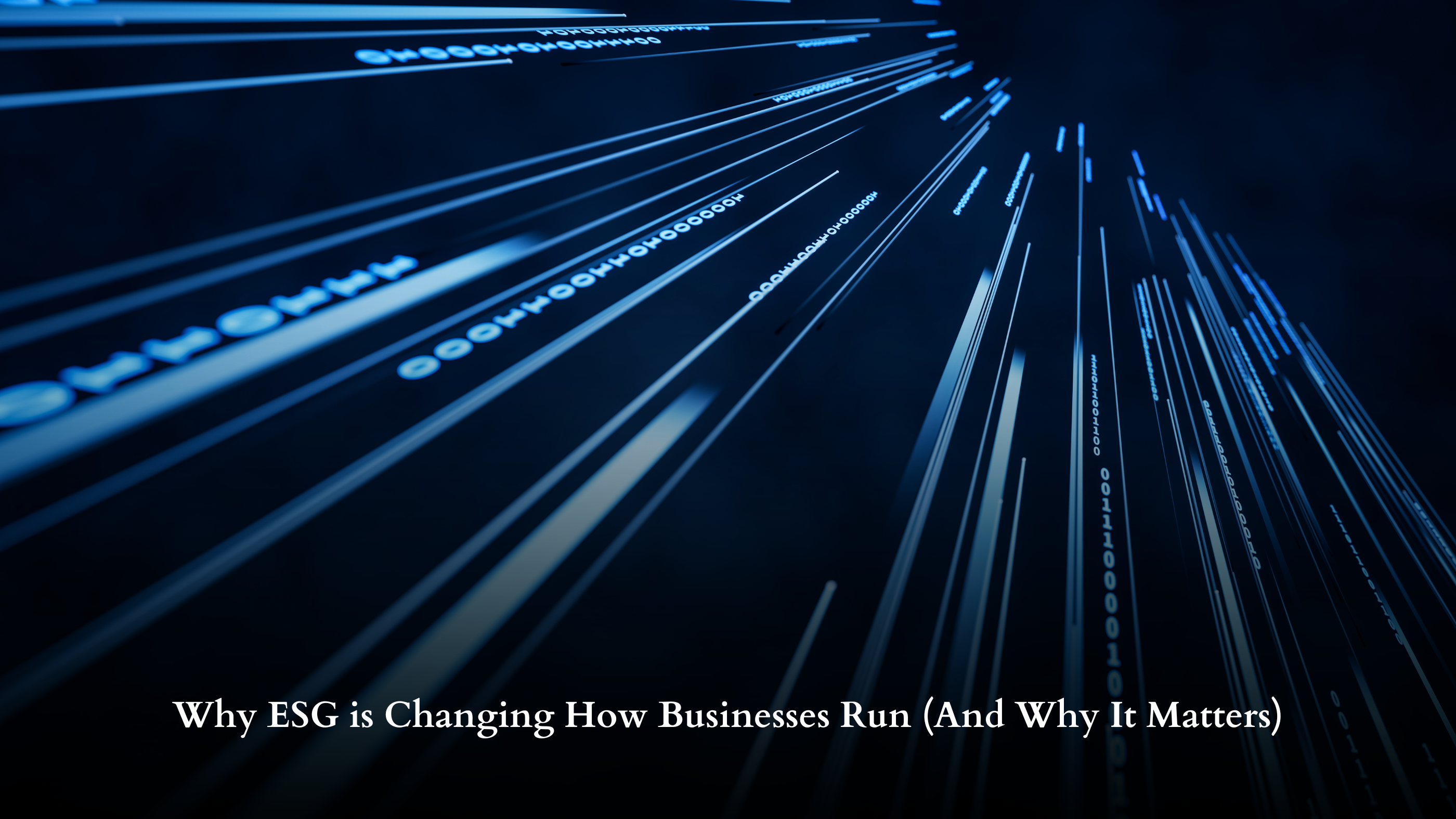
Look around times are changing, and businesses need to keep up. It’s not just about how much profit you make anymore. People want to know: Are you treating your workers right? Are you protecting the planet? And are you being honest about how you do business? That’s where ESG—short for Environmental, Social, and Governance comes into play.
If this sounds like a buzzword, you’re not wrong. But it’s also becoming a real game-changer for companies that want to grow without losing the trust of their customers, employees, and investors.
What Exactly is ESG?
ESG is just a fancy way of looking at business through three key areas:
- Environmental:
How is your business affecting the planet? Are you cutting emissions, using green energy, and managing waste responsibly? People care about this stuff—because climate change is everyone’s problem. - Social:
This part is all about people. Do you take care of your employees? Are your products safe? Do you give back to the community? Customers want to know that your business isn’t just out to make a quick buck. - Governance:
Good governance is about running your business with honesty and fairness. Are your leaders making ethical decisions? Is there diversity on your board? Governance ensures that what’s happening behind the scenes reflects your values upfront.
So, Why Should Businesses Care About ESG?
The truth is, ignoring ESG can hurt you in the long run. Here’s why businesses are making it a priority:
1. Investors Want More Than Just Numbers
Investors aren’t only looking at profits these days—they want to know how you’re managing risks. If your company has a messy environmental track record or treats employees poorly, it’s a red flag. In contrast, businesses that focus on ESG attract impact investors—people who want to put their money where it can do good and grow.
2. Regulations are Getting Stricter
Governments are laying down rules that force businesses to report their environmental and social impact. It’s no longer enough to say you care—you need to prove it. Companies that stay ahead of the game will save themselves a lot of trouble (and fines) later on.
3. Customers Care Where Their Money Goes
People, especially younger generations, pay attention to what companies stand for. If your business doesn’t align with their values, they’ll switch to a brand that does. But if you’re open about your ESG efforts and make a real impact, you can build loyalty that lasts.
What’s in it for Businesses?
Doing the right thing isn’t just good karma—it can also be good for business. Here’s how ESG creates real value:
- It Boosts Financial Performance
Believe it or not, being sustainable can actually save you money. Reducing waste, cutting energy costs, and keeping employees happy makes your business run smoother and more efficiently. - It Attracts the Right Kind of Investors
ESG-focused companies have access to green financing and other investment opportunities. Banks are even offering better loans to companies with strong ESG commitments. It pays to do the right thing—literally. - It Helps You Hire and Keep Talent
People want to work for companies with purpose. Strong ESG values help you stand out and attract top talent. Plus, employees who feel good about their workplace stick around longer, which reduces turnover (and saves you hiring headaches). - It Prepares You for the Future
Let’s face it—stuff like climate change isn’t going away. Businesses that plan for the future today will be more resilient when things get tough tomorrow.
What’s the Catch?
Of course, making ESG work isn’t always easy. Here are some of the biggest challenges companies run into:
- It’s Hard to Measure Progress
There’s no one-size-fits-all way to measure ESG success, which makes it tricky to compare yourself to others. Reporting can feel overwhelming, but it’s improving with better tools and frameworks. - It Can Cost Money Upfront
Going green or improving working conditions requires some investment. But businesses that commit to these changes early often reap bigger rewards down the road. - Greenwashing is a Real Risk
Some companies try to look more sustainable than they actually are. This backfires fast when customers or investors find out you’ve been faking it. Authenticity is key here—people can spot a phony a mile away.
What’s Next for ESG?
ESG is still evolving, but it’s clear that it’s here to stay. Here’s what’s coming:
- Better Reporting Standards
Frameworks like the Global Reporting Initiative (GRI) and Task Force on Climate-Related Financial Disclosures (TCFD) are making it easier to track and compare ESG efforts. Expect more transparency in the future. - Technology is Making ESG Smarter
Tools like AI and blockchain are helping companies track things like carbon emissions and labor practices in real time. This makes it easier to stay on top of ESG goals. - ESG Will Become Core to Business Strategy
Companies are realizing that ESG isn’t just an add-on—it’s part of how they operate. Businesses will keep embedding sustainability into their products and services as they grow. - Circular Economy Models are Taking Off
More companies are adopting circular economy practices—meaning they’re focused on reducing waste and reusing materials. This aligns perfectly with ESG goals and sets businesses up for long-term success.
Final Thoughts
At the end of the day, ESG isn’t just about being nice—it’s about building better businesses. Companies that take it seriously aren’t just doing the right thing—they’re setting themselves up for success in a world where people care about more than just profits.
Businesses that embrace ESG will attract loyal customers, committed employees, and smart investors. Those that don’t? Well, they risk being left behind.
The message is clear: ESG isn’t just a trend—it’s the new way of doing business. And the sooner companies get on board, the better off they’ll be.
Recent blog posts
Subscribe to get Notified
Subscribe to learn about new product features, the latest in technology, solutions, and updates.


